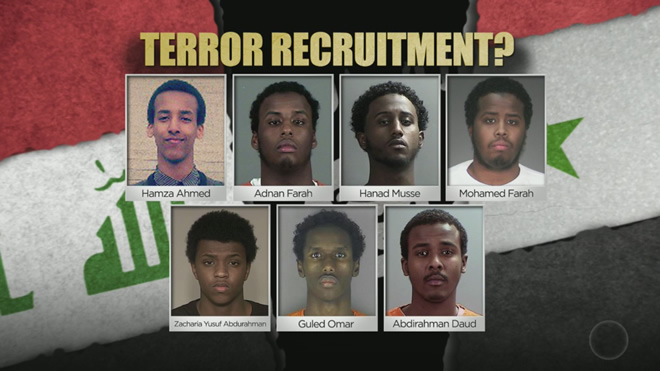
Wednesday, June 22, 2016
By Stephen Montemayor

Zacharia Abdurahman's family first to address community: "This is our reality."
One of the first Somalis to resettle in Minnesota in the early 1990s, Yusuf Abdurahman found work in a chicken processing plant in Marshall before meeting a beautiful woman he later married. On Tuesday, seated before several dozen community members inside the Minneapolis federal building, he urged a frank conversation about how young men like his son can become entranced by terror groups like ISIL.
“This is our reality,” Abdurahman said of his son, Zacharia. “My son is in jail now because of that reality.”
Abdurahman and two other family members who asked not to be named became the first relatives of the 10 Twin Cities men charged last year with trying to join the Islamic State in Iraq and the Levant (ISIL) to share their stories in a community forum.
U.S. Attorney Andrew Luger, whose office housed the meeting, said the family approached with a request to speak before last month’s trial of three Minneapolis men found guilty of trying to join ISIL. Luger asked members of the Somali-American Task Force to invite those who attended.
Zacharia Abdurahman, 20, awaits sentencing and faces up to 15 years in prison after pleading guilty in the case last year. His family took turns on Tuesday warning against denying that radicalization is a problem in the Twin Cities, home to the country’s largest Somali-American population but also its largest source of young men charged with attempting to join or successfully joining terror groups like ISIL and Al-Shabab.
“I’m not an informant, I’m not being paid by the U.S. government to be here,” Yusuf Abdurahman said. “I want to be here because I am a parent. … I’m here because I want you guys to know this issue is real.”
Abdurahman’s son and three others were stopped by agents in New York in November 2014 after trying to board planes for Europe. He backed out of a spring 2015 plan to acquire fake passports and fly overseas after crossing into Mexico, later telling Judge Michael Davis he feared he would get caught. Five others also pleaded and three were found guilty after a lengthy trial that ended earlier this month. Another man successfully reached Syria in 2014.
Hodan Hassan, chairwoman of the task force, moderated Tuesday’s discussion and asked the family if they could identify any signs they missed that signaled a change in Zacharia. One relative blamed peer influence. Another suggested social media was a conduit for communication among conspirators at home and overseas. But each said there were few signs that Zacharia longed to fight abroad.
“There isn’t any 101 manual on how to become radicalized,” said one relative, who described him as a “fun, cheerful guy” who liked to go horseback riding and play paintball. Zacharia worked nights as a security guard at a battered women’s shelter and studied computer science at a local technical college.
Yusuf Abdurahman said he believed it is even more difficult to identify signs of possible radicalization today than when Al-Shabab began recruiting Somali-Americans in 2007. He said recruits are told, “don’t disagree with your parents, just go along with everything.”
Luger told the audience that more families want to share their experiences in future meetings, something attendees seemed to welcome. One imam in attendance called for a meeting that included all of the community’s religious leaders, and Luger suggested future gatherings could be held with or without law enforcement present. Tuesday’s discussion was also attended by FBI leaders including Special Agent in Charge Richard Thornton.
“There must be unity in the community to help solve this,” Luger said. “And all of us must listen to and empower our youth to be part of the solution.”
Yusuf Abdurahman spent much of Tuesday afternoon asking for an end to finger-pointing in the community. Tension boiled over several times during last month’s trial among some families of defendants and members of the community. One spectator told the mother of a defendant who took the witness stand that her son was a spy. Two other families later engaged in a lunchtime confrontation that prompted a warning from the judge.
“When you have freedom to speak the truth, don’t be afraid,” Abdurahman said. “Let’s stop this labeling. Let’s stop calling people names like snitches when they tell the truth.”
Speaking after the meeting, Farhio Khalif, executive director of Voice of East African Women, added: “It’s good for parents to step up and say this is real and how can we help our youth. We must stop pointing fingers at each other. This has been happening since 2007.”